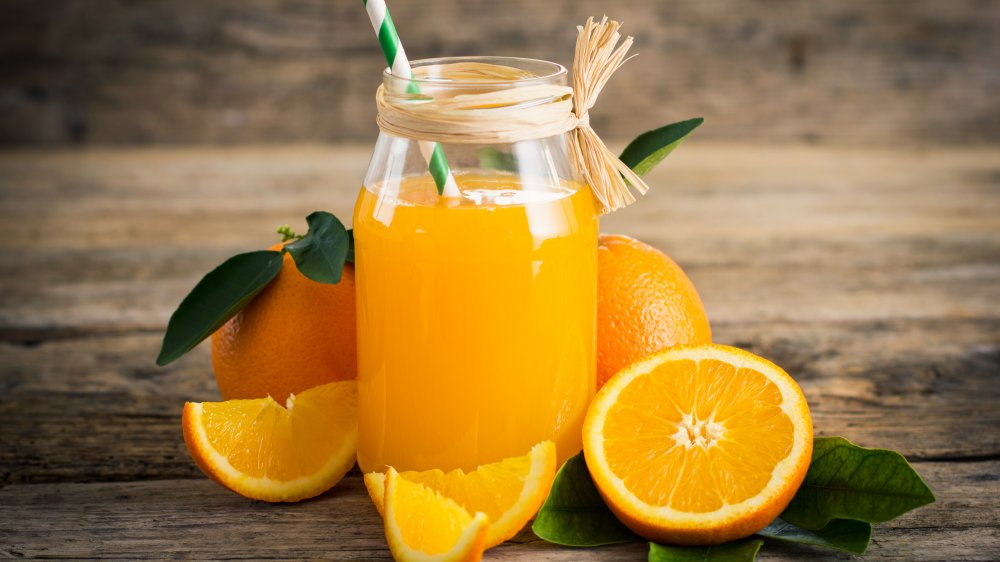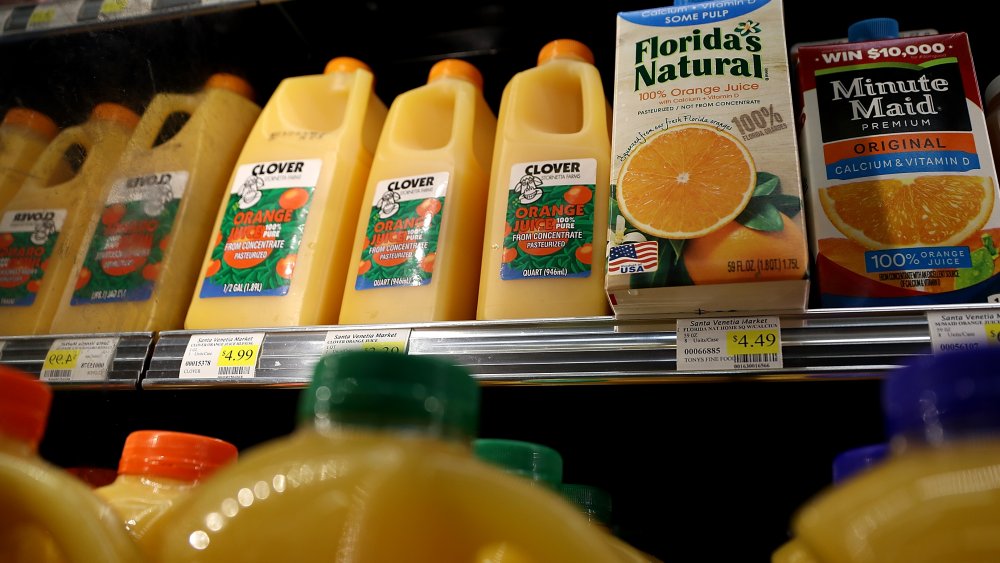The Real Reason Americans Have Stopped Drinking Orange Juice
Back in the 50s, it was the All-American thing to have a dog, a white picket fence, and a stay at home mom who poured you orange juice for breakfast. Remember when Don Draper went after the Sunkist account in Madmen (via Wired)? Orange juice was the industry to break into. In 1950, the average person drank 8 pounds of orange juice a year. By 1960, the average person drank 20 pounds (via The Atlantic). Those were the golden years. But 60 years later, orange juice producers started making national headlines screaming the apocalypse (for instance Quartz and The Washington Post). Things haven't gotten much better. In 2019, The Food Institute reported that orange juice contracts were down a whopping 20 percent.
What's behind the great orange juice downfall? You can blame part of it on citrus greening (otherwise known as huanglongbing) — the "measles outbreak" of the citrus world. Citrus greening is behind a massive, 72 percent decline in the production of oranges used for juice over the last decade (Chemical & Engineering News).
Then there's the fact that we just don't have time for breakfast anymore. The majority of Americans eat breakfast three times a week, and 13 percent of us rarely eat it at all (via Food navigator-usa). In generic terms, no breakfast means a lot less juice.
Finally? Orange juice, as the American public has recently found out, is not the innocent energy booster that 1950s Madmen-like advertisers wanted us to believe.
Can drinking orange juice make you sick?
In 1944, contaminated orange juice was behind an outbreak of typhoid fever at a small, residential hotel in Cleveland, Ohio (via American Public Health Association). In 1962, it was the vehicle behind a hepatitis outbreak at the Jewish Hospital of St. Louis, Missouri (via Jama). Those two cases are undoubtedly exceptions. Drinking orange juice will probably not give you typhoid or hepatitis. Nonetheless, the citrusy morning drink is a wolf in sheep's clothing.
It's all about the sugar. Even freshly squeezed orange juice has enough sugar in it to significantly raise your blood glucose levels. On average, it has just about as much sugar and calories as soda (via Fooducate and Insider). Like Coca-Cola, drinking it on a daily basis can increase your risk of weight gain, diabetes, and even heart and kidney disease (via Insider). Then again, drinking orange juice is scientifically linked to decreasing your risk of urinary stones, and new research suggests that it may be a suitable non-dairy alternative for probiotics (via The Journal of Urology and Food navigator-asia). Like they say, everything in moderation.
The Israeli start up trying to save the orange juice industry
If part of the reason that Americans have stopped drinking orange juice is its high concentration of sugar, then an Israeli start-up may be bringing orange juice back. In July 2020, Better Juice announced that it had successfully developed an enzymatic technology that significantly reduces orange juices' sugar content (via Store Brands and Food and Drink International).
According to Better Juice, by converting fructose, glucose, and sucrose into prebiotic dietary fibers, the enzymatic technology reduces the content of simple sugars in orange juice by an astonishing 80 percent. But wait. There's better news. If Better Juice is to be believed, the process actually brings out the taste of the fruit in the juice, making for a "better tasting product. The company reports having signed agreements with several global juice producers, including Citrusco, one of the world's largest orange juice producers (via Better Juice and Food and Drink International). It hopes that by next year, we'll be enjoying the results of their technology in our breakfast buffets. We hope so, too!


